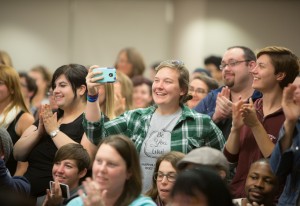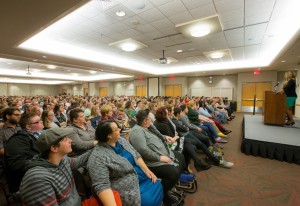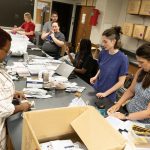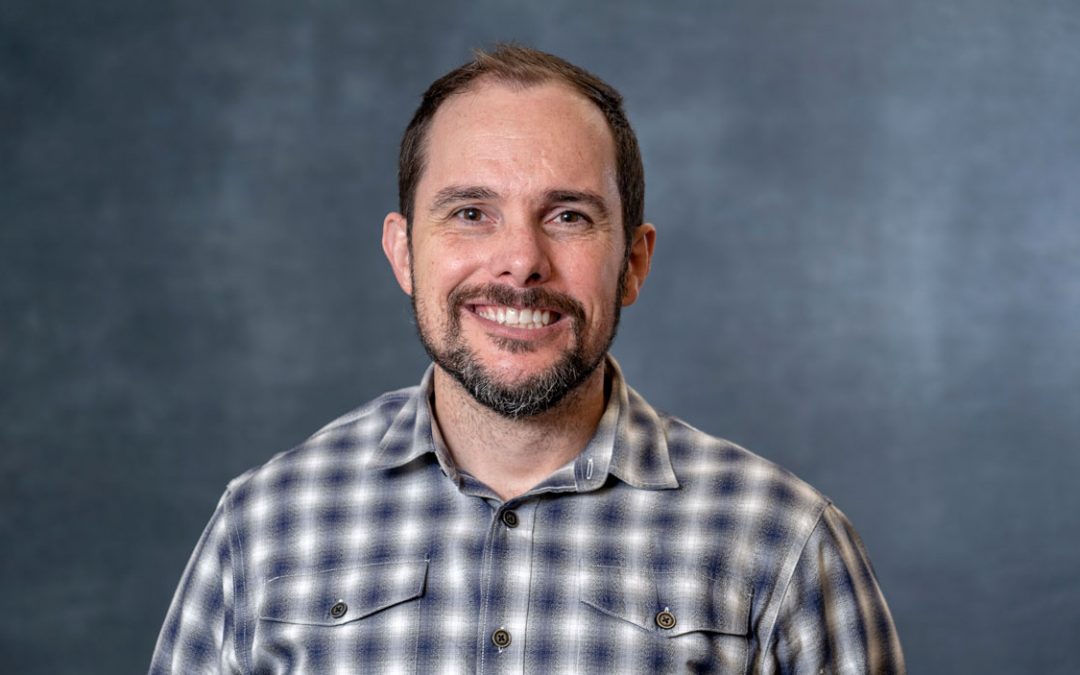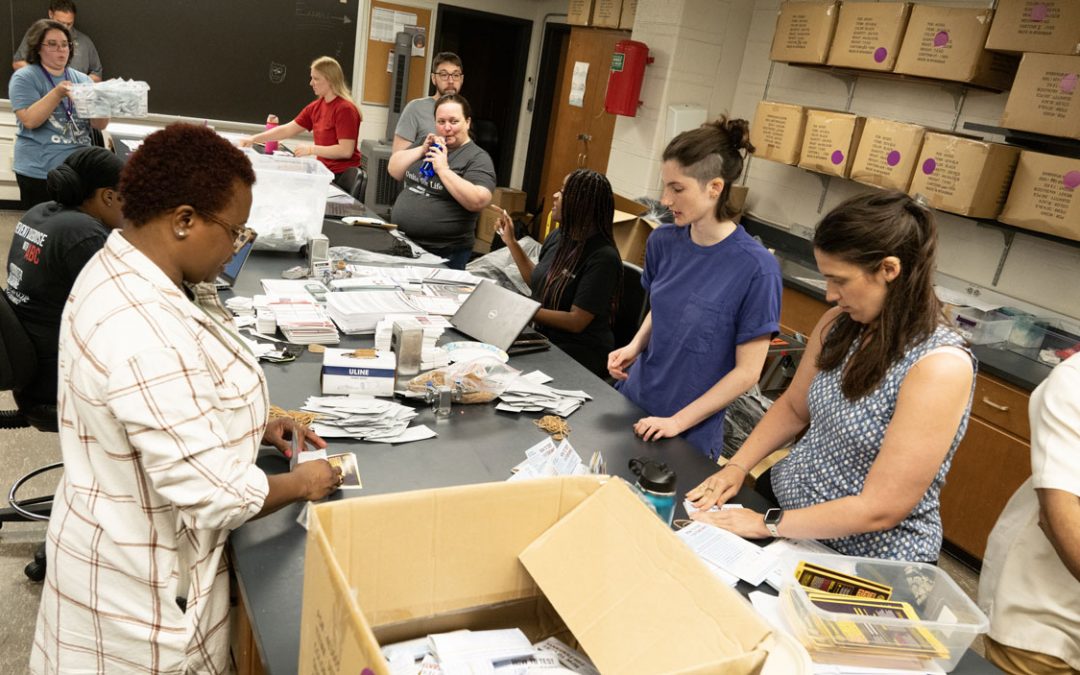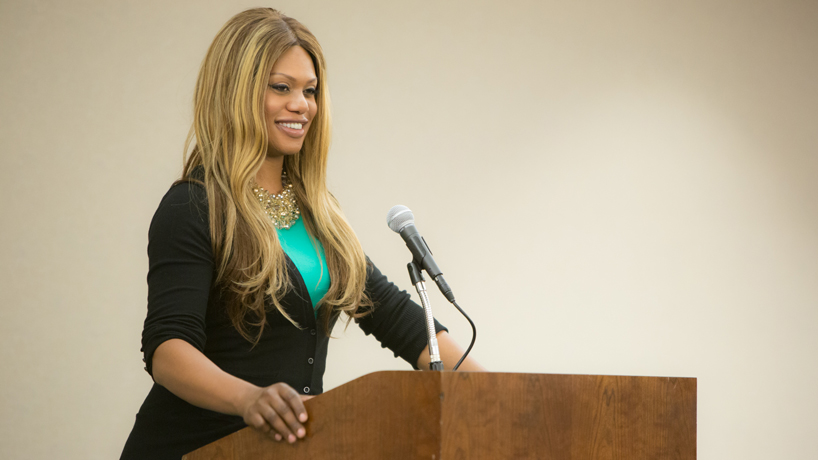
Laverne Cox spoke at UMSL Oct. 21 as part of the Student Life Speaker Series. (Photo by Rebecca Barr)
The first thing about her identity that Laverne Cox was aware of as a child was her race. The second was a difference that would leave Cox frequently bullied and feeling shame, even in preschool: gender expression.
“I felt that it was my fault, that there was something inherently in me that made me a target,” the acclaimed actress and transgender advocate told a sold-out crowd at the University of Missouri–St. Louis on Oct. 21. “At a very early age I began to feel that I am wrong.”
Visiting campus as part of UMSL’s Student Life Speaker Series, Cox discussed her life and personal path to womanhood before an audience composed of about 400 UMSL students and 200 other attendees gathered in the Millennium Student Center.
“I stand before you today a proud African American transgender woman,” Cox said, adding that her intersecting identities also include coming from a Southern working-class background and having an identical twin brother.
UMSL graduate student Jaleah Hollis, like many of those attending the talk, first encountered Cox in her portrayal of the incarcerated, transgender Sophia Burset in Netflix’s wildly popular show “Orange is the New Black.”
“When I found out earlier in the summer that she was coming to UMSL, I was elated,” Hollis said. “I wanted to know how her journey had been. I also have a childhood friend who is now a lesbian, and I just want to understand her better and be as supportive as possible. I believe education regarding their obstacles is essential.”
Cox spoke of her experience growing up, pinpointing moments that impacted her understanding of herself. She begged to take up dance as a child, and in third grade her mom, a devoted single mother, relented.
“My mother said, ‘You can take tap and jazz but not ballet,'” Cox recalled, adding that dance “truly saved [her] life,” allowing her to pursue something she was passionate about. Meanwhile, an elementary teacher was insisting her mother seek intervention.
“‘Your son is going to end up in New Orleans wearing a dress if you don’t get him into therapy right away,'” Cox recalled the teacher telling her mother.
When a therapist asked if Cox “knew the difference between a boy and a girl,” Cox responded that there was no difference.
“Everyone was telling me I was a boy, but I knew I was a girl,” she said. “I continued to go to the therapist, and eventually there was talk of injecting me with testosterone to make me more masculine … Luckily my mother said ‘No, we were not going to do that,’ but the damage was done.”
One of the most difficult points was during puberty, when church became a place where her differences were “not only a problem, but a sin, and I would burn in hell.” When her grandmother passed away, the struggle was too much.
“I didn’t want to live with the idea of her looking down on me and being disappointed,” Cox said, explaining that she then swallowed an entire bottle of pills and went to sleep hoping to not wake up.
“Forty-one percent of the transgender community has attempted suicide,” Cox said, adding that 78 percent of LGBT students K-12 encounter harassment and bullying.
In high school and college, Cox developed a deeper appreciation for the arts and also for the first time “felt shame about my race and my class.” She began building what she calls “shame resilience.”
“A lot of it had to do with changing my self-talk,” Cox said.
She experimented with the way she dressed, making the most of “Salvation Army couture – Salvation Armani, if you will.” Eventually winding up in New York City, Cox’s education was impacted by scholars like Judith Butler and bell hooks – and also by people she met through the nightclub scene.
“It was the first time in my life that my gender expression was something that was celebrated,” Cox said. “It felt really amazing.”
Before taking dozens of questions from students, Cox touched on racial oppression, gender policing and how to engage other people across differences.
“I’m never about approaching hate with anything else but love,” Cox said. “Go out into your lives and have those difficult conversations … living with empathy and with lots of vulnerability.”
Cox gave a personal example from the time she told her mother about her decision to transition and dropping her first name to go by her middle name, Laverne.
“The first thing my mother said to me was, ‘But you have such big hands and feet,'” Cox said. “Now, when someone uses the wrong pronoun to refer to me in front of my mother, she corrects them.”
Cox’s presentation was greeted with standing ovations, frequent bouts of collective laughter, unusual gifts and multiple requests for selfies.
“Having Laverne on campus is huge for UMSL,” said senior psychology major Dakota Dancy, president of PRIZM, UMSL’s queer-straight student alliance. “A little over a year ago I witnessed a trans man being attacked for no apparent reason. I stepped in as a bystander and was attacked as well. Having Laverne speak in this area at a time of healing for so many people gives me hope that we all can get over minute differences and stop harming others due to misconceptions about who we are as people.”
In November, UMSL will also host the Transgender Spectrum Conference, a two-day event featuring presentations, networking opportunities and workshops. Learn more about the conference at transgenderspectrum.com.

